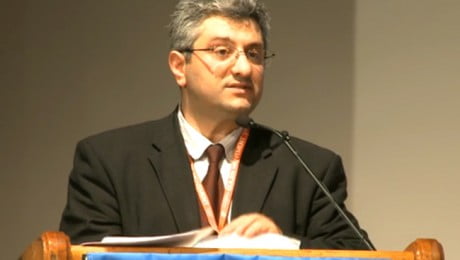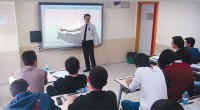Keyword: Hizmet (Gulen) movement

CHP leader calls on PM Erdoğan for explanation on action plan against Gülen movement
Republican People’s Party (CHP) head Kemal Kılıçdaroğlu has called on Prime Minister Recep Tayyip Erdoğan to explain why he signed a National Security Council (MGK) decision in 2004 recommending an action plan against the Gülen movement. “The fact that Erdoğan has [avoided] speaking on such an important matter proves his culpability,” Kılıçdaroğlu argued, accusing the government of hypocrisy.

Gülen ‘speechless’ on gov’t action plan against Hizmet movement
Islamic Scholar Fethullah Gülen has described himself as “speechless” and expressed his disappointment about a National Security Council (MGK) decision in 2004 signed by the government and recommending an action plan against Hizmet movement. A secret national security document recently discovered by the Taraf daily has revealed that Turkey’s ruling Justice and Development Party (AK […]

Did Erdoğan say ‘shut up’ to Gen. Eruygur?
EMRE USLU Liberal daily Taraf has published yet another document showing that the government, back in 2004, signed an agreement with the generals to fight the Gülen movement. The document outlined that the government agreed to prevent Gülen sympathizers from getting jobs in state institutions. Some political observers argue that the document shows that in […]

Gülen urges Hizmet members to defend prep schools in civilized way
Turkish Islamic scholar Fethullah Gülen has urged followers of the Hizmet movement to insist on the “right and logical” and defend prep schools, which the Turkish government has said it will shut down despite tremendous public outrage. In a speech broadcast by herkul.org, a website that usually publishes his speeches, Gülen said not insisting on […]

Turkish daily exposes secret plot against Gülen endorsed by gov’t
A secret national security document recently discovered by a Turkish daily has revealed that Turkey’s ruling Justice and Development Party (AK Party) government signed up to a planned crackdown on the Hizmet or Gülen movement. The Taraf daily published a document on Wednesday prepared by the National Security Council (MGK) on Aug. 25, 2004, persuading […]

Islamic scholar Gülen calls for ‘reasonability’ in prep school row
Islamic scholar Fethullah Gülen has called on the government to act “reasonably” in its plan to close test prep schools, adding that they were the ones receiving a “slap,” in a veiled reference to a statement from Prime Minister Recep Tayyip Erdoğan. You have to defend it without making concessions in the language you use,” Gülen said in an apparent message to members of the “Hizmet” [Service] movement.

The Shadow Politics of Shadow Education
It is no secret that Prime Minister Recep Tayyip Erdogan has grown wary of the so-called Gulen movement, a faith-based network centered on the charismatic preacher Fethullah Gulen that promotes a mild and modern understanding of Islam. Started in the 1960s, it now runs or influences, through its adherents, a large network of businesses, think tanks, newspapers and television stations — as well as a successful chain of tutorial colleges and private schools.

The recent fight between Kemalo-Islamism and Civil Islam
İHSAN YILMAZ As I have written here before, Islamists imagine Islam as a complete and ready-to-use divine system, with concrete political, cultural, legal and economic blueprints. Their ideology is exclusivist and they are not open to negotiation, compromise or pluralistic viewpoints. Islamists do not pay much attention to civil society and always pursue the seizure […]

Professor Ori Z. Soltes: ‘Fethullah Gülen wants to be an altruistic servant of others’
Professor Ori Z. Soltes, author of ‘Embracing the World: Fethullah Gülen’s Thought and Its Relationship to Jalaluddin Rumi and Others,’ explains how Gülen’s perception of Sufism is grounded particularly in the work of thinkers such as Jalaluddin Rumi, Ibn Arabi and Said Nursi, but is also grounded in the idea of selflessness.

Turkish government defiant as battle over prep schools rises
Both the government and the Gülen movement have raised the stakes in the debate over a plan to regulate private prep schools, or dershanes. The tension recently peaked, with Erdoğan describing the group’s objection to his government’s plans as a “smear campaign.” Ekrem Dumanlı, editor-in-chief of daily Zaman, which is known for its close ties with the Gülen movement, wrote an open letter to Erdoğan and urged him to review his decision.

AK Party deputy Hakan Şükür against closure of prep schools
Former national team captain and current Justice and Development Party (AK Party) İstanbul deputy Hakan Şükür, referring to the government’s plan to shut down prep schools, has said it was wrong to vote “yes” on their closure before a process is carried out which eliminates the need for the schools.

Fethullah Gülen urges followers to stick to path despite attacks
Turkish Islamic scholar Fethullah Gülen called on his followers on Monday to “just keep walking and not stop” in the face of controversial government plans to abolish privately-funded educational institutions known as dershanes, which assist medium and high school students to prepare for national college and university admission examinations.

Bittersweet joy for teachers amid prep schools conflict in Turkey
Zaman columnist Ali Ünal expresses how prep schools by the Hizmet movement were established under difficult circumstances under the leadership of Islamic scholar Fethullah Gülen. Preps schools prevent students from falling into bad habits by giving them both life and schools lesson at the same time at reasonable prices, writes Ünal.

An open letter to Prime Minister Tayyip Erdoğan
When it is necessary, making objections demonstrates honesty; approving everything is an indication of hypocrisy. So if all these people are saying that this is wrong, listening to them is not a weakness but a virtue. This is what the nation expects from you. Otherwise, it will take forever to heal the wounds that have been inflicted in their hearts. So is it worth it?


















